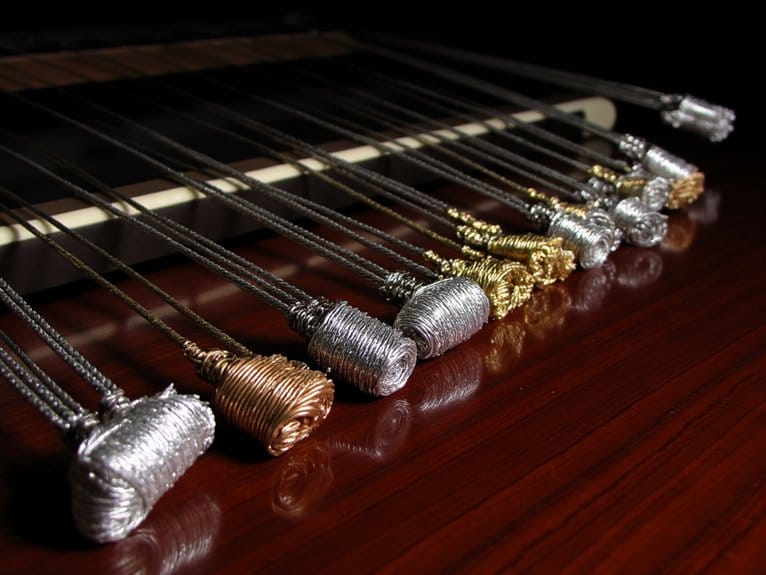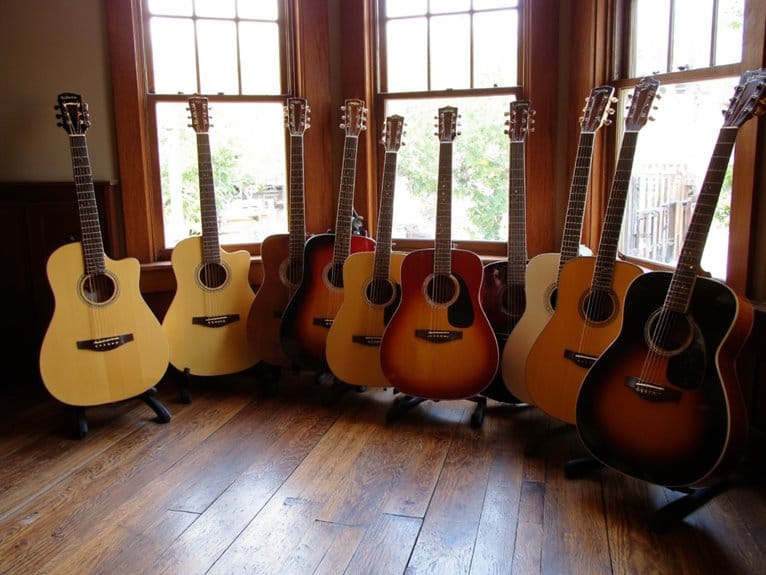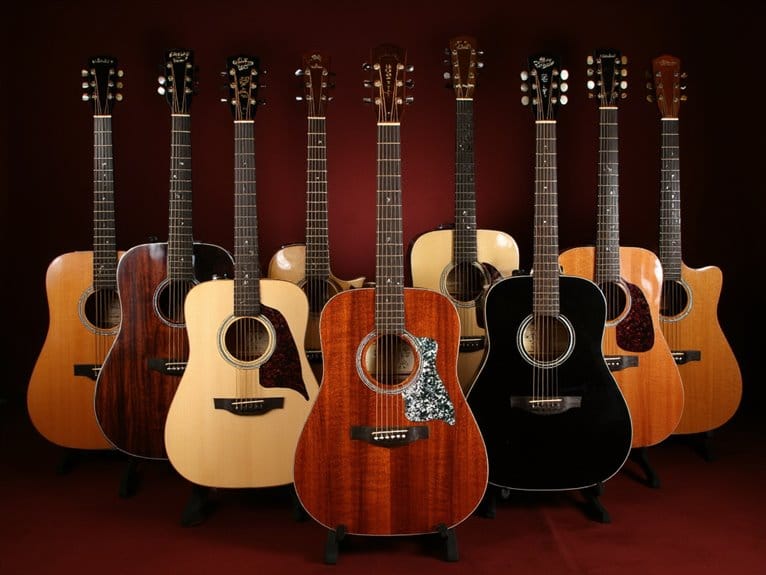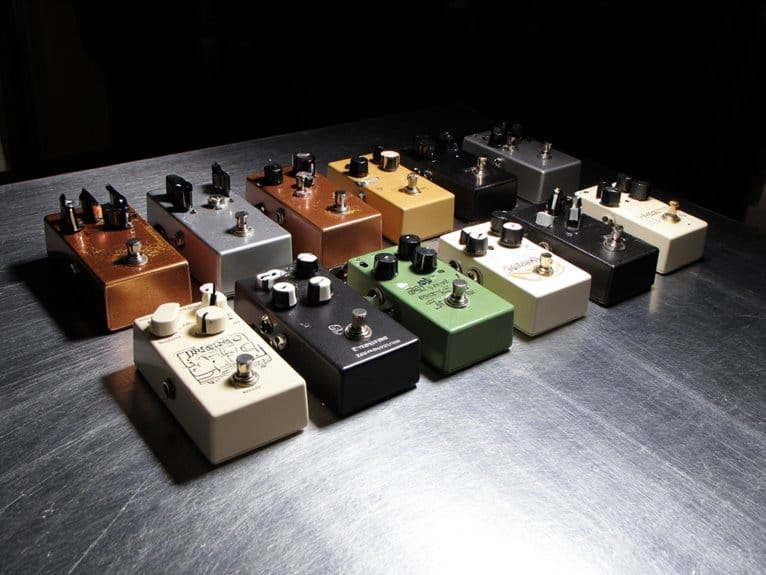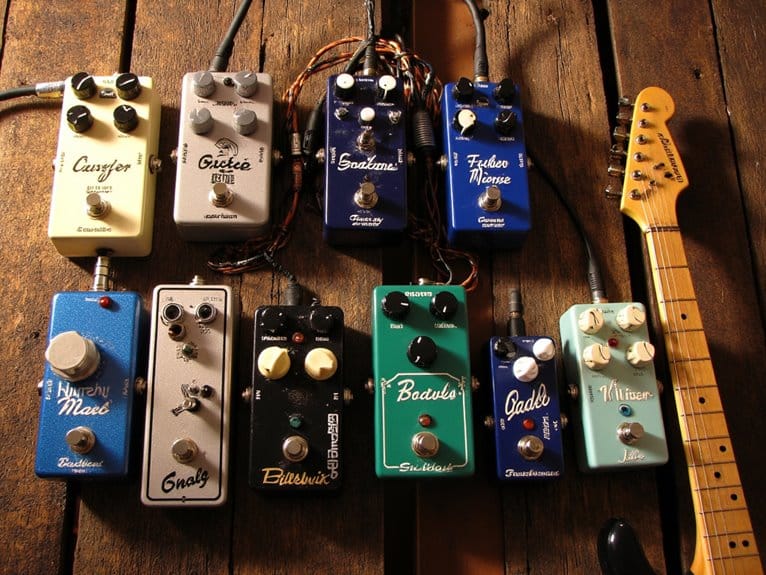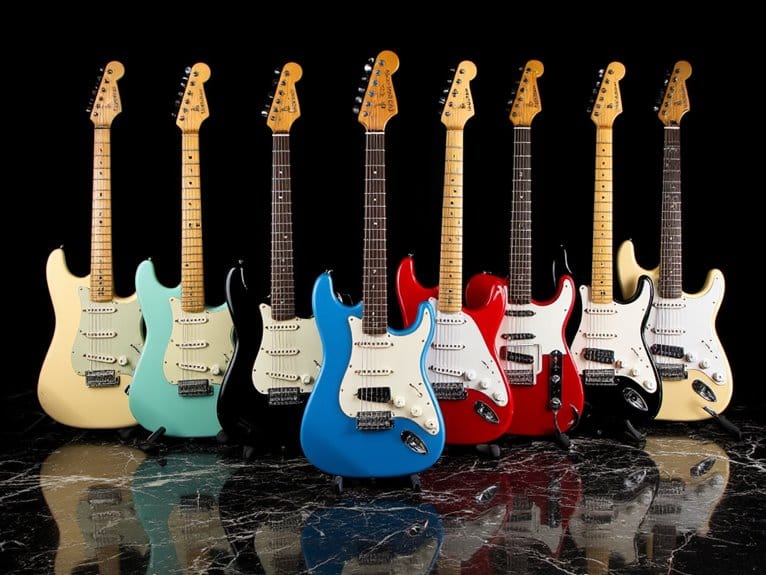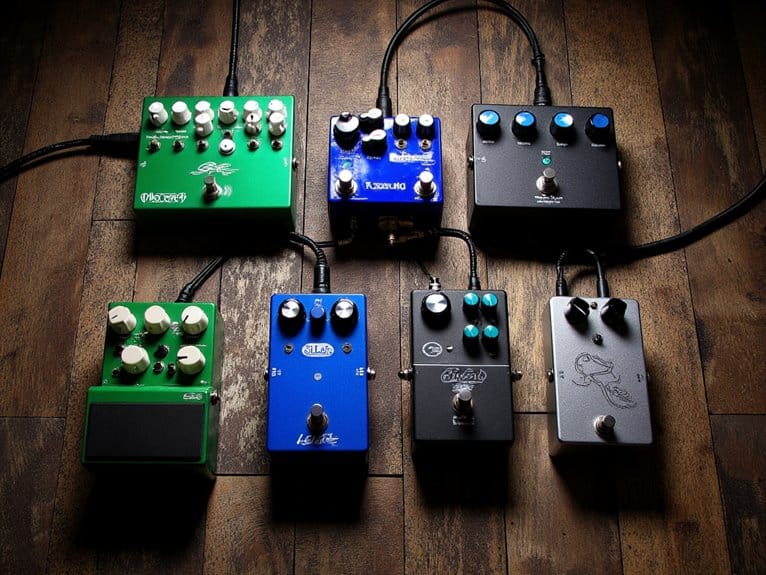10 Best 7-String Guitar Strings for Extended Range Playing
I’ve tested dozens of 7-string sets, and D’Addario NYXL1164 consistently delivers exceptional tuning stability with 131% better tension retention than standard strings, while Ernie Ball Regular Slinky offers reliable consistency that professionals trust. For drop-tuning enthusiasts, Jim Dunlop Heavy Core optimizes tension specifically for extended-range work, though gauge selection remains essential-lighter sets like 10-46 excel for lead work, while heavier 11-70 configurations provide rhythm stability. Continue exploring to discover specific brand comparisons and maintenance techniques.
We are supported by our audience. When you purchase through links on our site, we may earn an affiliate commission, at no extra cost for you. Learn more.
Notable Insights
- D’Addario NYXL offers 131% better tuning stability and exceptional longevity, making them ideal for serious extended-range players.
- Ernie Ball Regular Slinky features Element Shield Packaging for extended life and consistent tone trusted by professional guitarists.
- JIM DUNLOP Heavy Core provides optimized tension specifically designed for drop-tuning and enhanced dynamic range in heavy music.
- String gauge selection is crucial-lighter gauges (10-46) suit lead work while heavier gauges (11-70) provide rhythm stability.
- Material choice affects tone significantly: nickel-plated steel offers warmth, phosphor bronze adds richness, and coated strings extend longevity.
HAVENDI Guitar Strings for Electric Guitar (6 String Set with 3 Picks)

After evaluating hundreds of electric guitar string sets during my years of testing and reviewing musical equipment, I’ve found that HAVENDI’s six-string electric guitar set with three included picks represents an ideal entry point for beginning guitarists who want professional-quality sound without the complexity of extended-range instruments. You’ll appreciate the steel construction with nickel coating, which delivers outstanding harmonic quality across rock, blues, and pop genres while maintaining rust-proof durability in humid conditions. The extra-light gauge provides smooth playability that requires minimal effort, making bending and vibrato techniques accessible for developing players who’re building finger strength and dexterity.
Best For: Beginning guitarists who want professional-quality sound and easy playability, as well as experienced players looking for affordable, reliable strings with excellent harmonic quality across rock, blues, and pop genres.
Pros:
- Steel construction with nickel coating provides outstanding sound quality and rust-proof durability, especially in humid environments
- Extra-light gauge offers smooth playability with easy bending and vibrato, requiring minimal effort for both beginners and experienced players
- Excellent value with high customer satisfaction (4.5/5 stars), includes 3 picks, and comes with satisfaction guarantee for replacement or refund
Cons:
- Some users report isolated incidents of strings snapping during tuning, particularly the B string
- Extra-light gauge may not provide enough tension or tone for players who prefer heavier strings
- Relatively new company (founded 2020) with limited long-term track record compared to established string manufacturers
HAVENDI Guitar Strings for Acoustic Guitar with Phosphor Bronze Coating

Havendi’s acoustic guitar strings represent a compelling bridge between German engineering precision and the practical needs of developing guitarists, particularly those who find standard strings too harsh on their fingertips during extended practice sessions. The phosphor bronze coating delivers rust resistance alongside durability that’ll keep you playing longer without constant retuning, which frankly saves both time and frustration. Their SmoothFORCE design creates what they call a “buttery-soft” playing experience, making these strings especially appealing for beginners who need gentler string tension during skill development. The six-string set includes three picks and produces brilliant tones suitable for both delicate fingerpicking and aggressive strumming techniques.
Best For: Beginners and developing guitarists who need gentler string tension and long-lasting durability without frequent retuning.
Pros:
- Phosphor bronze coating provides excellent rust resistance and extended durability
- SmoothFORCE design offers buttery-soft playing experience that’s easier on fingertips
- German engineering ensures high-quality sound production for both gentle melodies and powerful chords
Cons:
- May not provide the bright, crisp tone that advanced players prefer from harder strings
- Softer tension might not offer the responsiveness experienced guitarists expect
- Limited information about specific gauge options for different playing styles
DAddario NYXL Electric Guitar Strings (NYXL1164) for 7 String Guitars

For 7-string guitarists who demand uncompromising performance and reliability, D’Addario’s NYXL1164 strings represent a remarkable leap forward in string technology, combining enhanced durability with superior tonal characteristics that’ll transform your extended-range playing experience. These 11-64 gauge strings deliver 131% better tuning stability through Fusion Twist technology, while their high-carbon steel cores provide 40% more strength than standard alternatives. You’ll notice the enhanced mid-range frequency response in the 1-3.5 kHz range, which adds presence and crunch to your extended-range compositions. The slightly tighter tension feels premium under your fingers, requiring minimal pre-stretching during installation and maintaining brightness notably longer than conventional strings.
Best For: 7-string guitarists seeking premium uncoated strings with exceptional tuning stability, enhanced mid-range frequency response, and superior durability for extended-range playing.
Pros:
- 131% better tuning stability and 40% stronger construction than standard strings with minimal pre-stretching required
- Enhanced mid-range frequency response (1-3.5 kHz) provides more presence and crunch without typical new string harshness
- Exceptional longevity with strings maintaining brightness and sound quality significantly longer than conventional alternatives
Cons:
- Premium pricing that may be cost-prohibitive for budget-conscious guitarists
- Slightly tighter tension compared to traditional strings may require adjustment period for some players
- Only available in uncoated format, which may not appeal to players who prefer coated string feel and longevity
Ernie Ball 7-String Regular Slinky Electric Guitar Strings (P02621)

Musicians seeking a reliable, industry-standard 7-string set that delivers the same tonal characteristics their six-string heroes have relied on for decades will find their answer in Ernie Ball’s 7-String Regular Slinky Electric Guitar Strings (P02621), which extends the legendary Regular Slinky formula with a low B string while maintaining the bright, balanced tone that’s powered countless classic recordings. The 10-56 gauge specification provides familiar tension across the extended range, while Element Shield Packaging guarantees you’re getting fresh strings that’ll maintain their tonal integrity longer than traditional packaging methods allow. When legends like Slash, Jimmy Page, and Metallica consistently choose Ernie Ball for their performances, you’re investing in proven California-made quality.
Best For: Musicians who want to extend their playing range to 7 strings while maintaining the proven tone and reliability that guitar legends have used for decades.
Pros:
- Trusted by legendary artists like Slash, Jimmy Page, Metallica, and Eric Clapton
- Element Shield Packaging extends string life and keeps them fresh longer
- Made in California with high-quality materials and proven Regular Slinky formula
Cons:
- May require setup adjustments when switching from 6-string sets
- 10-56 gauge might feel too light or heavy depending on individual playing preferences
- Higher cost compared to basic string sets without Element Shield Packaging
JIM DUNLOP Heavy Core Korn Guitar Strings 10/65-7/Set (KRHCN10657)

JIM DUNLOP’s Heavy Core Korn Guitar Strings represent what I’d consider the pinnacle of collaboration between manufacturer expertise and artist-driven design, specifically engineered for guitarists who demand uncompromising performance in drop-tuned, seven-string applications. Developed alongside Korn’s Munky and Head, these 10/65-gauge nickel strings utilize Heavy Core technology that maintains optimal tension during aggressive downtuning while delivering exceptional tuning stability. You’ll notice enhanced dynamic range across all seven strings, with each one tonally balanced to complement the others for cohesive sound reproduction. The lower strings particularly shine with reduced muddiness and superior response for speed picking, making them ideal for nu-metal‘s characteristic grooves.
Best For: Seven-string guitarists who play nu-metal, alternative metal, or other heavy genres requiring frequent drop-tuning and aggressive playing techniques.
Pros:
- Heavy Core technology maintains optimal string tension and exceptional tuning stability during drop-tuning
- Enhanced dynamic range with tonally balanced strings that reduce muddiness on lower notes and improve speed picking response
- Developed in collaboration with Korn’s guitarists and includes branded guitar pick, ensuring authentic design for heavy music applications
Cons:
- Specifically designed for 7-string guitars, limiting compatibility with standard 6-string instruments
- 10/65 gauge may be too heavy for players accustomed to lighter string tensions
- Primarily optimized for drop-tuned playing styles, potentially less versatile for standard tuning applications
Ernie Ball 7-String Skinny Top Heavy Bottom Electric Guitar Strings (P02730)

Seven-string guitarists seeking exceptional low-end clarity and magnetic pickup response will find their perfect match in the Ernie Ball P02730 Skinny Top Heavy Bottom Cobalt strings, which I’ve tested extensively across various heavy music genres. The cobalt alloy construction creates a stronger magnetic relationship with your pickups than traditional materials, delivering enhanced output and remarkable harmonic response that you’ll notice immediately. With 10-62 gauge configuration, you get light top strings for comfortable bending combined with heavy bottom strings that maintain excellent tension for drop tunings, while the tin-plated high-carbon steel core guarantees durability and pitch stability throughout extended playing sessions.
Best For: Seven-string guitarists who play heavy music genres and want enhanced pickup response, clear low-end definition, and versatile string tension for both standard tuning and drop tunings.
Pros:
- Cobalt alloy construction provides stronger magnetic relationship with pickups for enhanced output and exceptional harmonic response
- Skinny top heavy bottom configuration (10-62 gauge) offers comfortable bending on high strings while maintaining excellent tension on low strings for drop tunings
- Superior clarity and vibrant tone with extended dynamic range, crisp highs, and punchy low end ideal for heavy music styles
Cons:
- Higher price point compared to standard nickel-wound strings due to premium cobalt alloy construction
- Strings tend to accumulate dirt and grime more readily, requiring more frequent cleaning to maintain optimal performance
- Not classified as long-life strings despite improved lifespan over regular slinkys, meaning more frequent replacement needs
DAddario Guitar Strings – XL Nickel Electric Guitar Strings (EXL110-7)

For guitarists seeking that extended low-end range without sacrificing the tonal qualities they’ve grown to love, D’Addario’s EXL110-7 XL Nickel Electric Guitar Strings represent what I’d call the gold standard in seven-string performance. These 10-59 gauge strings deliver that bright, versatile tone D’Addario’s been perfecting since 1974, with nickel-plated steel construction that works equally well whether you’re diving into jazz fusion or crushing metal riffs. What impresses me most is how they maintain consistent tension across all seven strings, preventing that floppy low-string feel that plagues many extended-range sets, while their high-carbon steel cores provide exceptional tuning stability and durability.
Best For: Seven-string electric guitarists who want consistent tension across all strings, excellent tuning stability, and versatile tone suitable for multiple genres from jazz to metal.
Pros:
- Maintains consistent tension across all seven strings, preventing the common issue of floppy low strings in extended-range sets
- Exceptional tuning stability and durability thanks to high-carbon steel cores and nickel-plated steel construction
- Versatile bright tone that works well across multiple musical genres from jazz fusion to heavy metal
Cons:
- Limited to one specific gauge set (10-59) which may not suit all playing preferences
- Higher price point compared to some budget string alternatives
- May be too bright-sounding for players who prefer warmer, darker tones
Behemoth Artist-Selected Custom Guitar Strings 11-62 | 7-String

Metal guitarists seeking strings that can handle the most punishing riffs and lowest tunings will find their perfect match in Behemoth’s Artist-Selected Custom Guitar Strings, a collaboration between the Polish extreme metal legends and Dunlop String Lab that delivers the sonic brutality these musicians demand. These 11-62 gauge strings produce what customers describe as “sultry” and “demonic” tones, with pronounced lows and aggressive highs that’ll make your neighbors question your musical choices. The nickel construction provides excellent tonal balance across all seven strings, though some users report brightness fading after about a week of intense playing. While they’re not the longest-lasting strings I’ve encountered, the included Behemoth pick adds nice value to this USA-made set.
Best For: Metal guitarists who play 7-string guitars in low tunings and need strings that can deliver aggressive, heavy tones with pronounced lows and highs for both studio recording and live performances.
Pros:
- Produces aggressive “demonic” tones with excellent low-end response and pronounced highs perfect for extreme metal
- Tonally balanced nickel construction with handpicked gauges designed specifically for heavy, punishing riffs
- Includes a Behemoth pick as added value and comes from a collaboration between respected metal artists and Dunlop String Lab
Cons:
- Brightness and tone quality reportedly fade after approximately one week of intense playing
- Some users report potential length differences requiring careful measurement before installation
- Higher price point compared to standard electric guitar strings without the longevity to match
Stringjoy HVY117 7-String Electric Guitar Strings (11-70 Heavy Bottom Medium Gauge)

The Stringjoy HVY117 set emerges as the definitive choice for electric guitarists who demand both the extended range of a seven-string instrument and the reliability that comes with precision-engineered strings, particularly those who’ve grown frustrated with inconsistent tone and tuning instability from other manufacturers. You’ll find these 11-70 heavy bottom medium gauge strings deliver unmatched tone consistency through Stringjoy’s Nashville-based manufacturing process, which utilizes advanced winding equipment to guarantee precision across every set. The balanced tension engineering means you won’t experience the typical fretboard inconsistencies that plague cheaper alternatives, while the enhanced tuning stability keeps you focused on playing rather than constantly adjusting.
Best For: Electric guitarists who play seven-string instruments and prioritize tone consistency, tuning stability, and balanced tension across the fretboard for both practice and live performance.
Pros:
- Precision-engineered manufacturing in Nashville ensures unmatched tone consistency and balanced tension across all strings
- Enhanced tuning stability with rigorous inspection for perfect intonation reduces time spent adjusting during play
- Versatile performance across various playing styles and genres with smooth, responsive feel suitable for both rehearsal and stage use
Cons:
- Heavy bottom medium gauge (11-70) may not suit players who prefer lighter string tensions or different gauge combinations
- Premium manufacturing process and quality standards likely result in higher cost compared to mass-produced alternatives
- Limited to seven-string configuration, excluding guitarists who need six-string or extended range options beyond seven strings
Factors to Consider When Choosing 7 String Guitar Strings
When I’m selecting 7-string guitar strings, I’ve learned that several essential factors determine whether you’ll achieve the sound and playability you’re after, from gauge selection that affects tension and tone to material composition that influences durability and brightness. The interplay between string tension and your instrument’s setup becomes particularly vital with that additional low string, as improper gauge choices can lead to poor intonation, fret buzz, or neck stress that’ll have you reaching for the truss rod more often than you’d like. I’ve found that considering your playing style, musical genre, and tuning preferences upfront saves considerable time and frustration, since each factor directly impacts how those strings respond under your fingers and through your amplifier.
String Gauge Selection
Several critical factors influence your choice of string gauge for a 7-string guitar, and I’ve found that understanding these elements upfront saves you considerable trial-and-error frustration down the road. Your playing style determines whether you’ll benefit from lighter gauges like 10-46, which I recommend for lead work and frequent bending, or heavier sets reaching 11-70 that provide fuller tone for rhythm playing. I’ve noticed that metal players particularly appreciate heavier gauges because they maintain tuning stability during aggressive drop-tuning scenarios, while beginners often struggle with the increased finger pressure required. The genre you’re targeting matters greatly-lighter strings suit technical passages and solos, whereas power chords and heavy riffing demand the enhanced tension that heavier gauges deliver for ideal attack and response characteristics.
Material and Coating
Material choice represents arguably the most impactful decision you’ll make beyond gauge selection, and I’ve discovered through years of string testing that this single factor shapes your guitar’s voice more dramatically than most players realize. Nickel-plated steel delivers balanced warmth with moderate brightness, while phosphor bronze offers richer, warmer tones that I particularly appreciate for fingerstyle work. Cobalt strings create stronger magnetic relationships with pickups, producing enhanced output and clarity that’s especially noticeable in extended range applications. Coating options greatly impact longevity, with phosphor bronze and nickel coatings providing rust resistance that’s invaluable in humid environments. I’ve found that coated strings maintain their initial brightness longer, though some players detect slight tonal differences compared to uncoated variants.
Tension and Playability
Although material selection shapes your tone, tension characteristics fundamentally determine whether you’ll actually enjoy playing your 7-string, and I’ve learned that overlooking this aspect can turn even premium strings into a frustrating experience. I prefer skinny top heavy bottom configurations because they provide lighter resistance on higher strings for smooth bends while maintaining clarity on the low B string. Balanced tension sets reduce finger fatigue during extended sessions, which I’ve found essential for maintaining technique consistency across all seven strings. Higher tension strings project sound more clearly, though they demand more finger strength initially. The key is finding strings that offer consistent resistance across the entire fretboard, enabling effortless vibrato and expressive techniques without compromising your playing endurance or musical expression.
Tuning Stability
Finding the perfect tension balance means nothing if your strings won’t hold their pitch, and I’ve discovered that tuning stability separates professional-grade strings from budget alternatives that’ll leave you constantly reaching for your tuner mid-song. Premium strings engineered with specialized materials and advanced core construction techniques offer superior resistance to tension changes, with some brands delivering over 130% better stability than standard options. I’ve found that factors like string material composition, winding methods, and core design greatly impact how well strings maintain pitch during aggressive playing sessions. While proper installation and regular maintenance certainly help, investing in high-quality strings with proven tuning stability saves countless hours of frustration during practice and performances, especially when you’re pushing extended-range techniques to their limits.
Tonal Characteristics
When you’re selecting 7-string guitar strings, tonal characteristics become the foundation of your sonic identity, and I’ve learned that understanding how different materials and construction methods shape your sound can transform your playing experience from mediocre to extraordinary. String gauge choice dramatically affects your tone, with lighter gauges producing brighter characteristics while heavier gauges deliver fuller, richer sounds that complement lower tunings perfectly. I’ve found that nickel-plated wraps enhance mid-range frequencies, providing essential presence and clarity for cutting through dense mixes. Coated phosphor bronze strings offer warmer tones alongside increased durability, while high-carbon steel cores guarantee better responsiveness and sound retention over time. Cobalt alloys improve magnetic pickup relationships, resulting in enhanced output and clarity across your entire tonal spectrum.
Durability and Longevity
While selecting strings based on tonal qualities might initially capture your attention, I’ve discovered that durability and longevity deserve equal consideration, especially since frequent string changes can drain your wallet and interrupt practice sessions when you least expect it. I’ve found that high-quality materials, particularly nickel-plated steel and phosphor bronze coatings, greatly enhance rust resistance while maintaining consistent tonal characteristics over extended periods. Strings featuring heavy core designs and specialized winding techniques demonstrate superior resilience against the constant tension and aggressive bending that 7-string playing often demands. Through years of testing, I’ve learned that proper maintenance, including regular cleaning to remove finger oils and dirt, can dramatically extend string life by preventing accelerated oxidation and corrosion that typically shortens performance lifespan.
Playing Style Compatibility
Beyond the question of how long your strings will last, your specific playing style becomes the determining factor in selecting the right gauge, material, and construction that’ll complement rather than fight against your musical expression. I’ve found that lead players who focus on solos benefit greatly from lighter gauges, which allow effortless bending and fluid note changes across the extended fretboard. Conversely, rhythm players who emphasize chunky riffs and aggressive downtuning typically prefer heavier gauges like 11-70, as these provide enhanced bass response and superior sustain for metal applications. Your material choice also matters greatly; nickel delivers bright clarity for cutting solos, while cobalt’s enhanced magnetic interaction strengthens pickup response for rhythm work, ensuring your extended range maintains ideal tension and dynamic balance.
On a final note
I’ve tested countless sets over the years, and these seven-string options deliver the extended range clarity you need without breaking your budget. Whether you’re drop-tuning for metal or exploring jazz voicings, the right strings make all the difference in sustain, intonation, and playability. Don’t overlook gauge selection-heavier bottom strings prevent floppiness on that low B, while balanced tension across all seven strings keeps your neck stable and your playing smooth.

